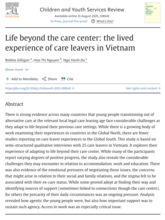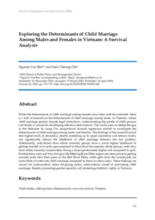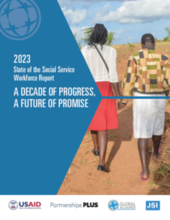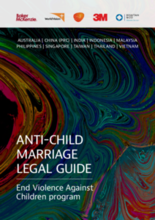Displaying 1 - 10 of 65
This study examines the transition experiences of 25 care leavers in Vietnam through semi-structured qualitative interviews. While many showed resilience and made progress, they also faced significant challenges related to housing, work, education, social relationships, and stigma, highlighting the crucial role of external support in sustaining their agency.
While the determinants of child marriage among females have been well-documented, there is a lack of research on the determinants of child marriage among males. This study aims to bridge the gap in the literature to investigate the determinants of child marriage among males and females in Vietnam.
Many children in Vietnam who lost their parents to COVID aren't getting by as support from the outside world is unsustainable.
This report examines the evolution of social service workforce strengthening in the light of the three core pillars of the Social Service Workforce Strengthening Framework: planning, developing and supporting. It identifies significant progress and accomplishments that have been made to strengthen the social service workforce at the global level as well as in three specific countries: Romania, Uganda and Viet Nam.
This Anti-Child Marriage Guide produced by World Vision aims to empower and educate users as how to best navigate regulatory hurdles that may arise when assisting children affected by child marriage. This fourth legal guide addresses frequently asked questions relating to protecting victims of child marriage in Australia, Mainland China, India, Indonesia, Malaysia, the Philippines, Singapore, Taiwan, Thailand, and Vietnam.
The UN Child Rights Committee (CRC) today issued its findings on Germany, Kuwait, North Macedonia, the Philippines, South Sudan, Ukraine, Uzbekistan and Viet Nam after reviewing the eight States parties during its latest session.
There are limited studies which investigate the perceived needs and wellbeing of parents caring for their children with disability from culturally and linguistically diverse communities. This qualitative study uniquely explored the experiences and cultural factors of Vietnamese parents caring for children with a disability in multicultural Australia.
The authors of this study investigated the prevalence rates of childhood trauma, depressive symptoms, anxiety symptoms and suicidal behaviors among Vietnamese adolescents and compared the differences between institutionalized adolescents (IAs) and noninstitutionalized adolescents (NIAs). In addition, they examined the multidimensional associations between childhood trauma and psychopathology among IAs.
By drawing on the experiences of parents, advocates, NGOs, and public officials, this side event invited discussion on how, through strengthening families and tools for prevention, societies can reduce the number of children being institutionalized. During the event, a panel of experts from the Republic of Moldova, South Africa, Burkina Faso, Vietnam, and the United States explored their experiences around efforts to empower parents and keep children with disabilities with their families.
By drawing on the experiences of parents, advocates, NGOs, and public officials, this side event will invite discussion on how through strengthening families and tools for prevention, societies can reduce the number of children being institutionalized.




